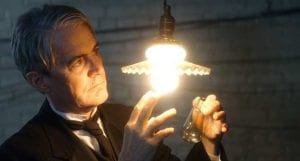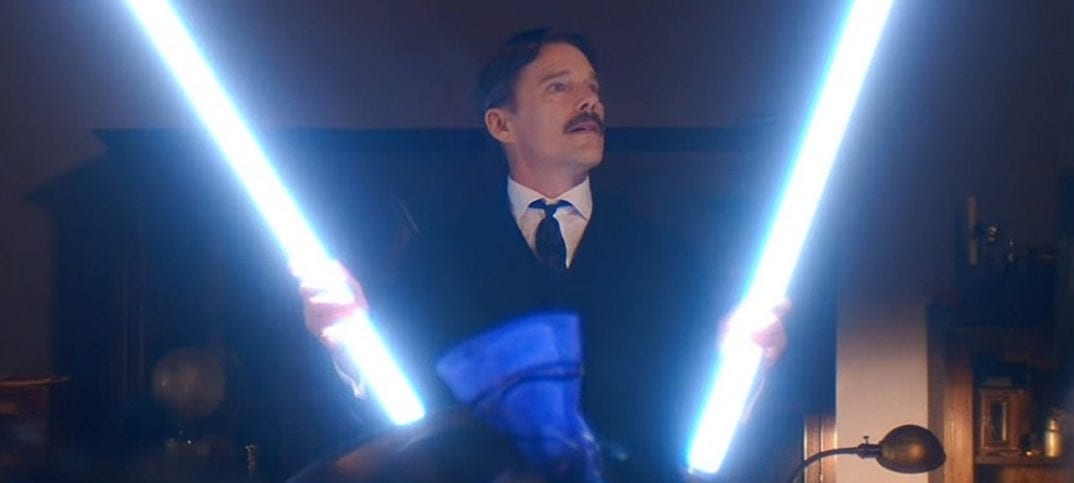Reviewed By Jeffrey Sanzel
After dropping out of Harvard, writer-director-producer Michael Almereyda got a Hollywood agent based on a spec script about inventor and innovator Nikola Tesla. Tesla now arrives in theaters (and streaming) some three decades later. In the meantime, Almereyda has made over two dozen films, ranging from shorts to feature length to documentaries. He has worked with many of the same actors over the years — in this case reuniting with Ethan Hawke (who starred in Almereyda’s modern-dress Hamlet), Kyle MacLachlan, and Jim Gaffigan.

The film is not a complete biopic but instead begins in 1884 when Tesla was unhappily working for Thomas Edison in his workshop. It quickly presents their incompatibility and Tesla’s subsequent embarkation on an independent path. The focus is on the battle between Edison’s direct current and Tesla’s alternate current. (Some of this material was covered in Alfonso Gomez-Rejon’s The Current War, which emphasized the business competition between Edison and George Westinghouse with Benedict Cumberbatch as the former, Michael Shannon as the latter, and Nicholas Hoult in the less prominent role of Tesla.)
The structure of Tesla is eclectic. It is narrated by Anne Morgan, daughter of mogul J.P. Morgan, who later bankrolls Tesla. Dressed in period garb, she talks to the camera, referencing her laptop, and siting Google searches. This sets the tone for what is going to be an unconventional structure. The visual elements are highly stylized, with scenes often played out against enlarged photos, painted backdrops, or stock footage. Sometimes this is highly effective; other times it has the feel of the cheaply made educational films of the 60’s and 70’s.
There is nothing wrong with this strange, theatrical tactic. Often, the unexpected vision or rough approach bring the explored world into a different focus by not enslaving it to its period. The result can present old concepts in new lights. When this fails, works such as these can still succeed as a triumph of style over substance. Unfortunately, Tesla is no triumph. The scenes that are part of the historical narrative are meandering, with a lot of mumbling scientific jargon that is no doubt well-researched and accurate, but make for very slow going.
Tesla should not be a history report: It should engage on some visceral level. The surrounding structure is uniquely artistic and unpredictable; the content plays as pedestrian. The result is like a pie with an amazing and complex crust but a bland, tasteless filling.
There is a wonderful scene that ends in a small food fight between Edison and Tesla. This, like several other moments, are then corrected as only fantasy. The random appearance of a cellphone is a slyly introduced anachronism. This is where the film delights and surprises. The speculation, the what-if’s, and the flights of fancy engage us for a few moments but then we drift back into soporific stupor. There is great deal espoused about idealism versus capitalism and creation versus commerce. All are important concepts but they are not presented in any dramatic fashion.
When Tesla sets up his laboratory at Wardenclyffe in Shoreham, there are enough lightning flashes and electrical storms for half a dozen Frankenstein movies. It is stretches like these that seem to go on with little purpose.
Ethan Hawke makes Tesla a brooding genius, full of tics and OCD. As always, he fully commits to the role and delivers the best he can. But the problem is we never really learn who Tesla is. In many ways, he is a cipher at the center of his own story. Kyle MacLachlan’s Edison is an egotist of epic proportion but allows flashes of doubt to peek through. There are occasional sparks between them and the rivalry between these dysfunctional geniuses offer the strongest sequences. If only there were more.
Eve Hewson’s Anne Morgan is a fully-realized character, the underlying but never spoken love for Tesla a driving factor. She makes the marveling at his genius and exasperation with his inability to communicate completely natural. Jim Gaffigan is a blowsy and sincere George Westinghouse and loses himself in the character. J.P. Morgan, as played by Donnie Keshawarz, enters late and is a borderline melodrama villain.
Rebecca Dayan as the grand dame of the theatre, Sarah Bernhardt, steers her away from the dangers of caricature, and her fascination with Tesla is intriguing if not fully explored. The rest of the cast are given one note each to play, and they struggle along with the weightier sections of exposition.
There are at least half a dozen electrical references that could be made to cleverly sum-up Tesla — comments about random sparks or broken circuits. But, ultimately, it is much simpler than that: The film just doesn’t work.
Tesla is rated PG-13 for some thematic material and some nudity.







